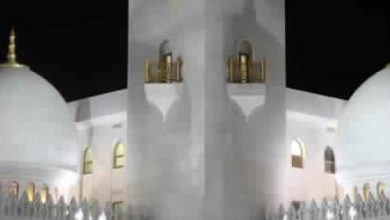THE BOY AND THE KING

A Sudden Death
Finally the boy confronted the King and told the frustrated King that if he wanted to kill him, he should gather the people in an assembly and hang him by the trunk of a tree, and then shoot him with an arrow after saying “In the Name of Allah, the Lord of the worlds.”
The King was delighted by the solution and did as the boy suggested. Before the assembly of the whole village, the King took aim, and said “In the name of Allah, the Lord of the young boy.” As promised, the arrow hit its mark and the boy died.
However, this public declaration of the King convinced the spectators to believe in Allah, and they embraced Islam in droves. This was the direct opposite of what the King had intended!
The King was furious, and commanded that trenches be dug at certain points, and fires to be lit within. The believers were rounded up and forced to jump into the flames, burning themselves alive.
Amongst the villagers was a mother, who was too terrified to throw herself into the fire. However, Allah allowed her infant child to talk and reassured her to endure the ordeal for it was the Truth. This child was one of the two or three people who were allowed by Allah to talk during infancy.
Thus all the believers met their painful and brutal ending.
The King, his elite government, his army and the disbelievers were then cursed by Allah SWT with various calamities. In some reports, the earth engulfed them and the whole kingdom vanished. Another report claimed that an earthquake destroyed them. The main point is that all of them died in disgrace and Allah SWT promised them severe torture in hellfire for infinity.
Cursed were the companions of the trench [Containing] the fire full of fuel,
When they were sitting near it, and they witnessed what they were doing against the believers (i.e. burning them). (Al Qur’an 85:4 – 85:7)
Lessons Learnt
The boy had a choice to either be a magician – a person with status in the society, or to believe in the monk. He could either believe in Allah and pay for the consequences of such belief, or to be the magician, attaining all the dunia status, but denying the message. The two paths were the opposing forces the boy, and in fact, all of us, have to choose from.
Viewed from the eyes of dunia, the boy, the hermit, the blind governor and the villagers were all losers. They all died horrifically and prematurely. Yet, from an Islamic perspective, Allah had honoured them. Their deaths were their victory, because they all held fast to their belief in Allah up to the end of their lives. They triumphed with their steadfastness, even if they paid for their faith with their lives. So immense was their glory that they are mentioned in the Qur’an, as live examples for all of us until the end of time.
This story also demonstrates the power of one boy, who transformed his whole village through his faith and by belonging to Allah alone. He did not need to organise demonstrations, riots or political coups. He overcame the odds because Allah was with him. He lived and he died for the message. He did not do it for material gain, and in fact, gave up a potential lifetime of luxury and prestige. His level of sacrifice even motivated him to voluntarily tell the King of the correct method to execute him (by invoking the name of Allah), in order for the message to spread.
The governor in the story is reminiscent of the Pharaoh’s magicians. Once he distinguished the truth from falsehood, he, although a fresh Muslim, held on to his faith even though he was tortured to death because of it.
Today, we place reliance on our titles, money and connections and believe that these will give us victory. This story demonstrates that the opposite is true. The nobility in this story were cursed by Allah, as in the high ranking officials and others who were disbelievers and oppressors, and who persecuted the believers of God. How can there be victory if one’s everlasting home is the tortures of jahannam?
Conversely, those who relinquished their dunia in the path of Allah received infinite and eternal victory. Their lives on earth ended in an instant, but they were so honoured by Allah Himself in the Qur’an, and their lives in the hereafter will be majestic and full of the wonders of jannah.
We should question ourselves on where we stand. If our lives are dedicated to oppression, suppressing the truth and the pursuit of dunia at all costs, then we know from the Qur’an what the future will hold for us.
However, if we want to return to the reason of our existence on earth, we will choose the alternative road. This story tells us, however, although this is the better path, it is not the easier one. It will entail the sacrifice of dunia on several levels, and can be fraught with hardship, loneliness and obstacles. However, with Allah on your side, it is not the external circumstances of dunia that matters, but rather, the ultimate prize, jannah, which is worth more than the whole earth and what it contains. The prize is high, and therefore, so is the price.
We all have the potential to be the “boy” in this story. So let us rise up, for ourselves, for our families and for our ummah, and try to follow in his footsteps, ameen. The potential change caused by one person is immense, and imagine if all of us tried to make that change, how much it would affect our entire planet, collectively.


![Photo of THE QUR’ANIC MAP [PART 1]](/wp-content/uploads/2020/09/MFS-quran_map-part1-390x220.jpg)
![Photo of THE QUR’ANIC MAP [PART 2]](/wp-content/uploads/2020/09/quranicmap_part2-390x220.jpg)
![Photo of THE QUR’ANIC MAP [PART 3]](/wp-content/uploads/2020/09/quranicmap_part3-390x220.jpg)